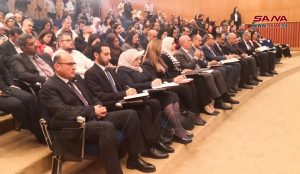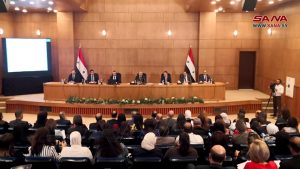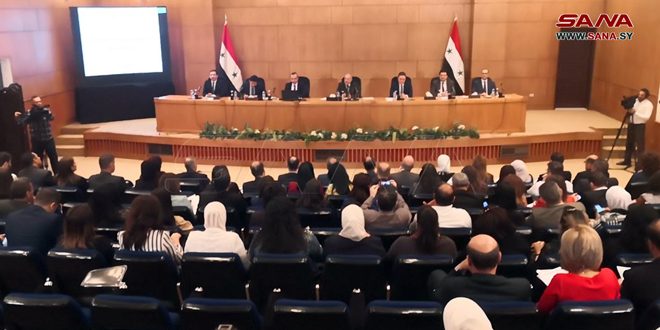Arnous holds a press conference on the national plan to deal with the repercussions of the earthquake
Damascus, (ST) – The Cabinet, during its weekly session on Tuesday, approved the basic trends of the government’s policy to deal with the repercussions of the earthquake.
The trends aim at unifying the efforts of all the state institutions, organizations, civil society actors, the countries that provide aid and all associations to ensure the rehabilitation of the affected areas and the reactivation of the economic process. They also aim at securing infrastructure and services in parallel with securing houses for those affected, reinforcing damaged buildings and providing aid to residents at shelter houses.
The Cabinet also approved the national action plan to tackle the repercussions of the earthquake. The plan, which focuses on helping people in the affected areas to restore their normal life, improving the urban reality and providing a suitable environment for systematically dealing with the repercussions of the earthquake.
In a press conference, Prime Minister Hussein Arnous affirmed that the government has worked in full coordination with all components of society, including associations, organizations and federations, since the first moments of the earthquake, to confront the repercussions of this disaster.
“The government has dedicated all available capabilities to mitigate the earthquake’s effects”, he added.
Arnous said in a press conference about the national plan and the basic elements for building the government’s policy to tackle the repercussions of the earthquake: “Today, we began a more advanced stage, which is to start reconstructing dozens of buildings in Aleppo and Lattakia as a first step to secure permanent housing for those affected by the earthquake.
Eng. Arnous added: “The national action plan to deal with the repercussions of the earthquake is comprehensive and concerned with dealing with the damage that befell individuals and society as a whole.”
“Rehabilitation is a responsibility shared by the state and society”, he continued.
Arnous pointed out that hundreds of thousands of apartments have been inspected, noting that more than 59 thousand buildings need to be strengthened.
Arnous said that the national action plan meets basic human needs and did not ignore the damage to archaeological sites.
 He added that the final time frame for accomplishing temporary residence sites is the end of the coming December.
He added that the final time frame for accomplishing temporary residence sites is the end of the coming December.
Arnous said: “We are working in cooperation with the private sector to secure job opportunities for those affected by the earthquake. “We are continuing to provide facilities to restart the damaged economic establishments and finance small projects”, he added.
Arnous said: The educational losses in the areas affected by the earthquake will be compensated, and the schools used as shelters will be evacuated in August.
Arnous continued: We formed a five-member committee of the Engineers Syndicate, the Ministries of Public Works and Local Administration, university professors, and contractors to determine the direct causes that led to the damage to a number of modern buildings as a result of the earthquake, and in the event that any failure is proven, those responsible will be held accountable.
 In response to a question by SANA reporter, Arnous said: According to the criteria for rebuilding destroyed buildings, work will be done to make them more earthquake-resistant.
In response to a question by SANA reporter, Arnous said: According to the criteria for rebuilding destroyed buildings, work will be done to make them more earthquake-resistant.
Raghda Sawas

